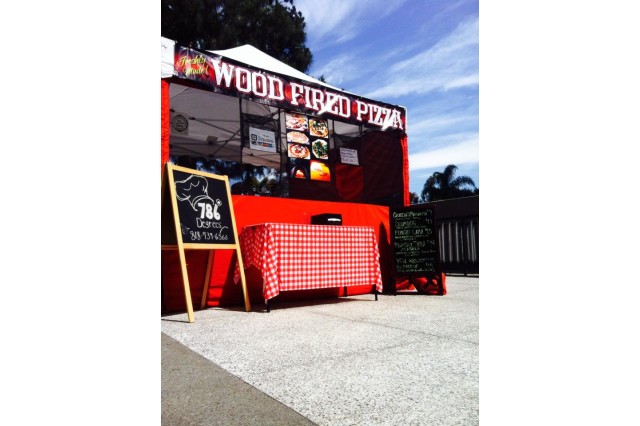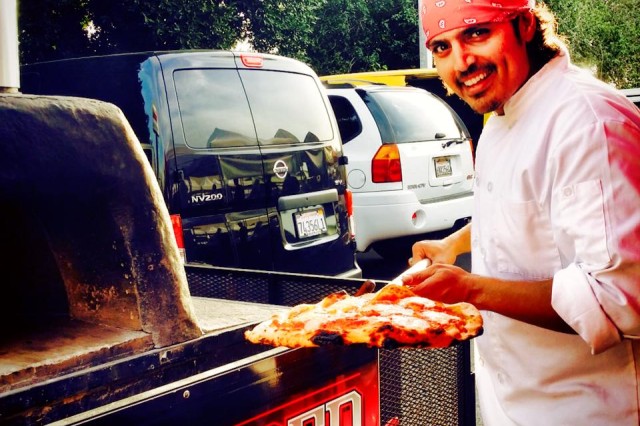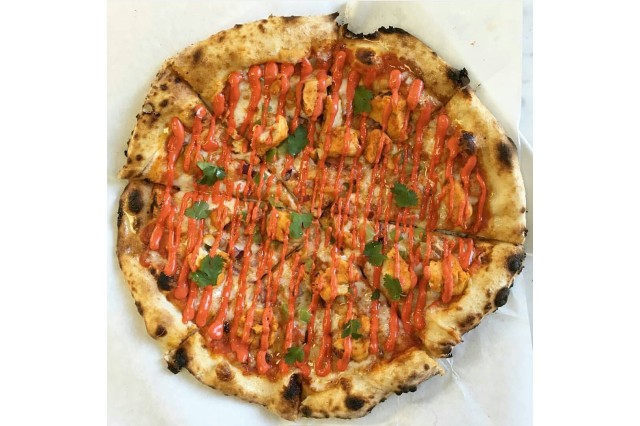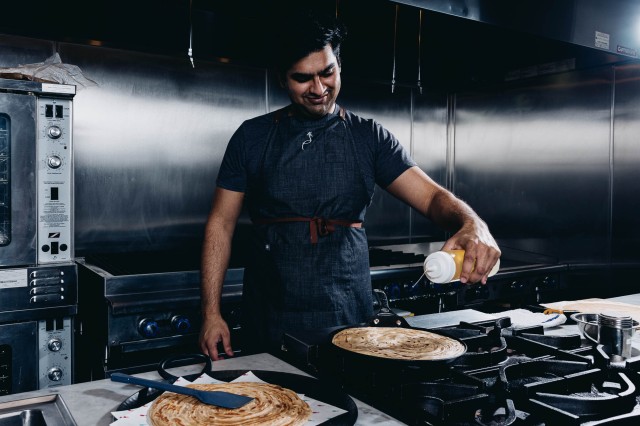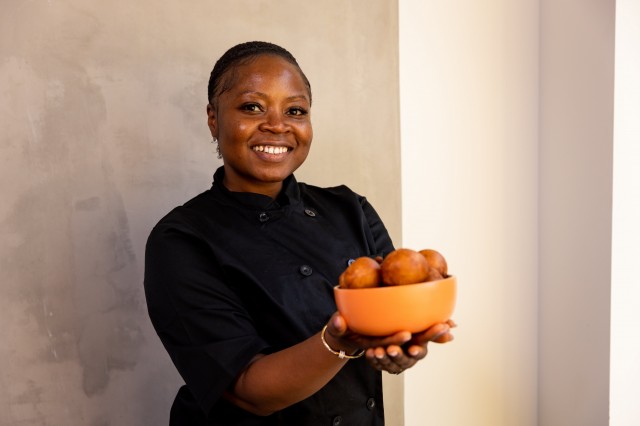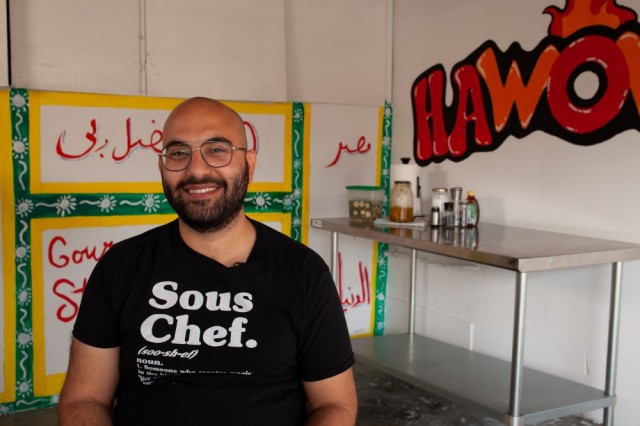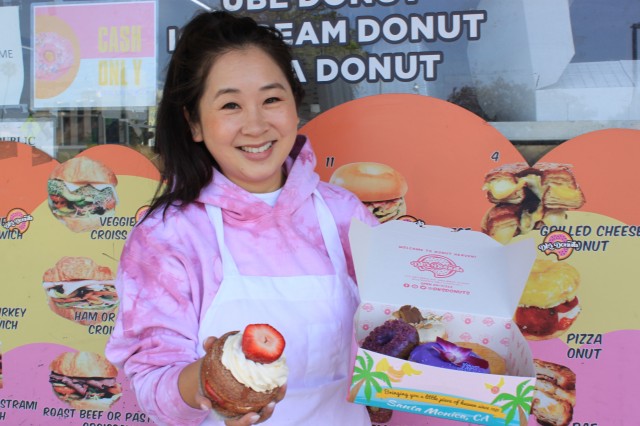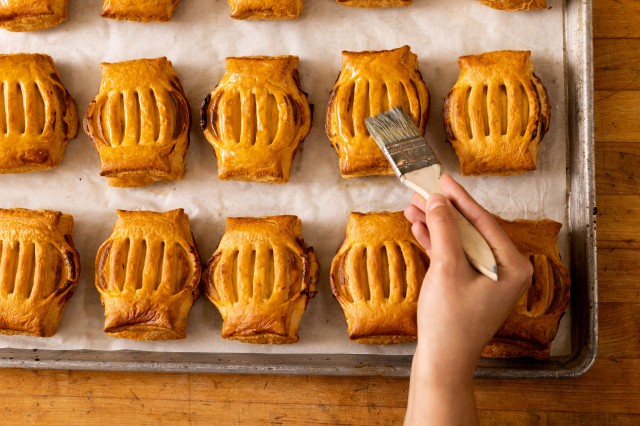
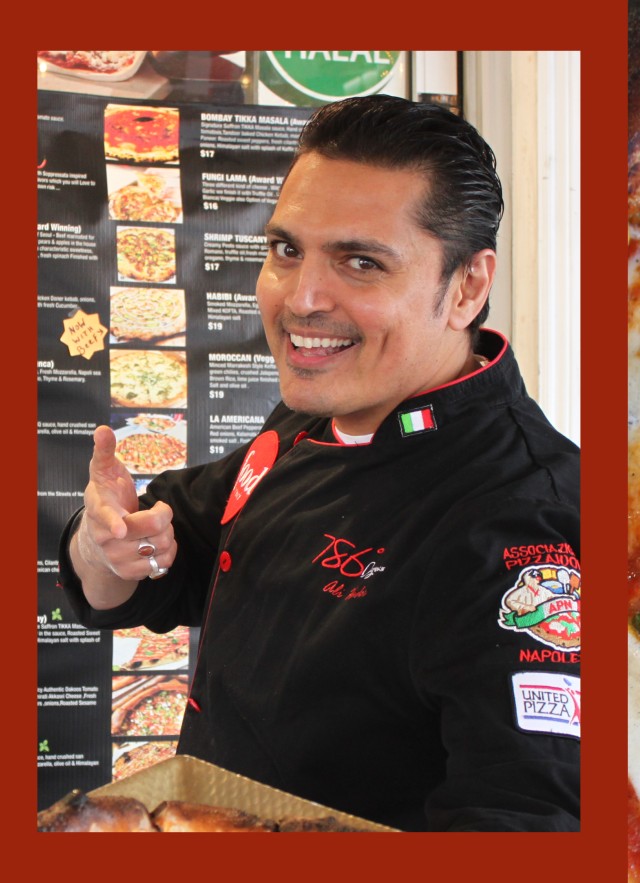
Kneaded: L.A. Bread Stories celebrates Los Angeles’ history, heritage, and communities through the lens of bread.
Chef Ali Haider, founder of 786 Degrees, decided to leave his career to pursue his passion for making pizzas! Join us for an interview with Chef Ali as we learn more about his commitment to local ingredients, the intentionality behind his ceramic pizza ovens, and how food led him to a career filled with passion and connection to his family.
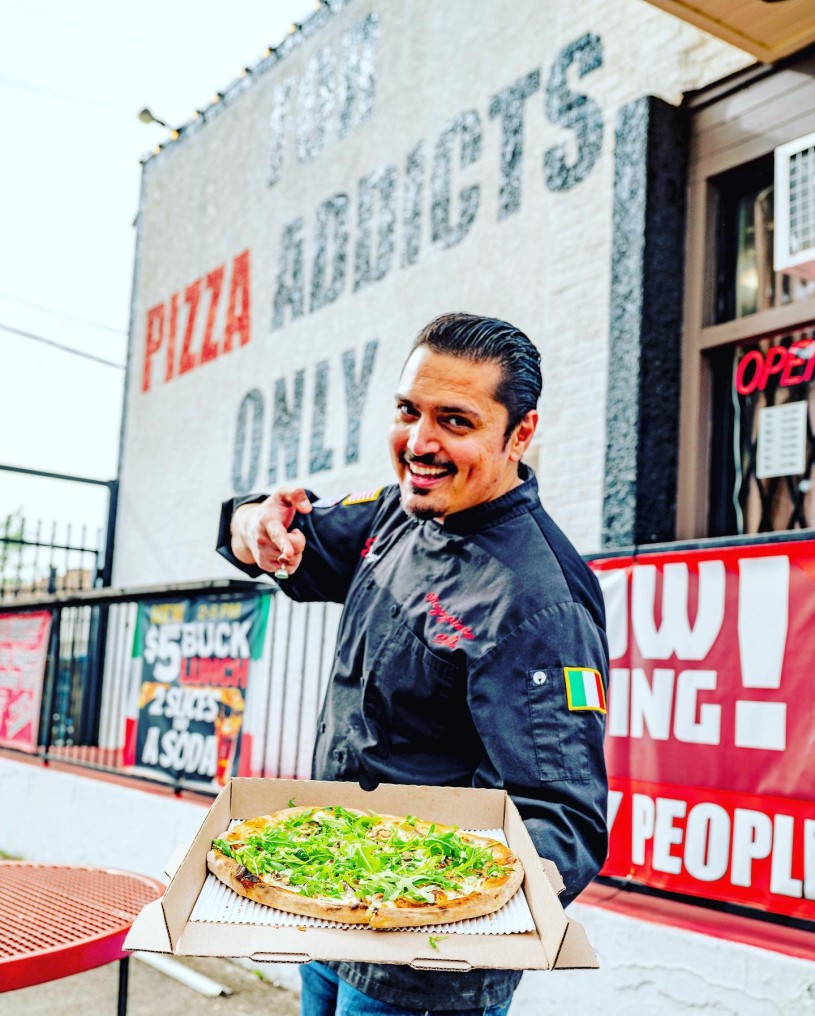
I want to serve something which everybody could fall in love with, but with a twist…My vision was to pick up the beautiful flavors from all over the world and paint them onto pizza.
Ali Haider Ali
Tell us about yourself and how you got started in L.A.
I was born in Kuwait and am a mix of different ethnicities. I came to the United States as a student and worked for some time as a spokesperson for several high-end automotive companies. I am blessed to speak several languages, and that did work for some time, but after a while I wanted to settle down and follow my passion–which was food. My passion went from food to bread and then pizza. I now have a catering business and two pizza shops, one in Pasadena and the other in Sun Valley.
I am a pizzaiolo and was certified in Naples, Italy. I want to serve something everybody could fall in love with, but with a twist. As a kid, I was extremely creative which has continued for me as an adult. So when it came to selecting a style of food to focus on, I could not just pick one type of food like Korean, Halal, Indian, or Pakistani. Why just stick to one style? My vision was to pick up the beautiful flavors from all over the world and paint them onto pizza–I wanted to take pizza to the next level.
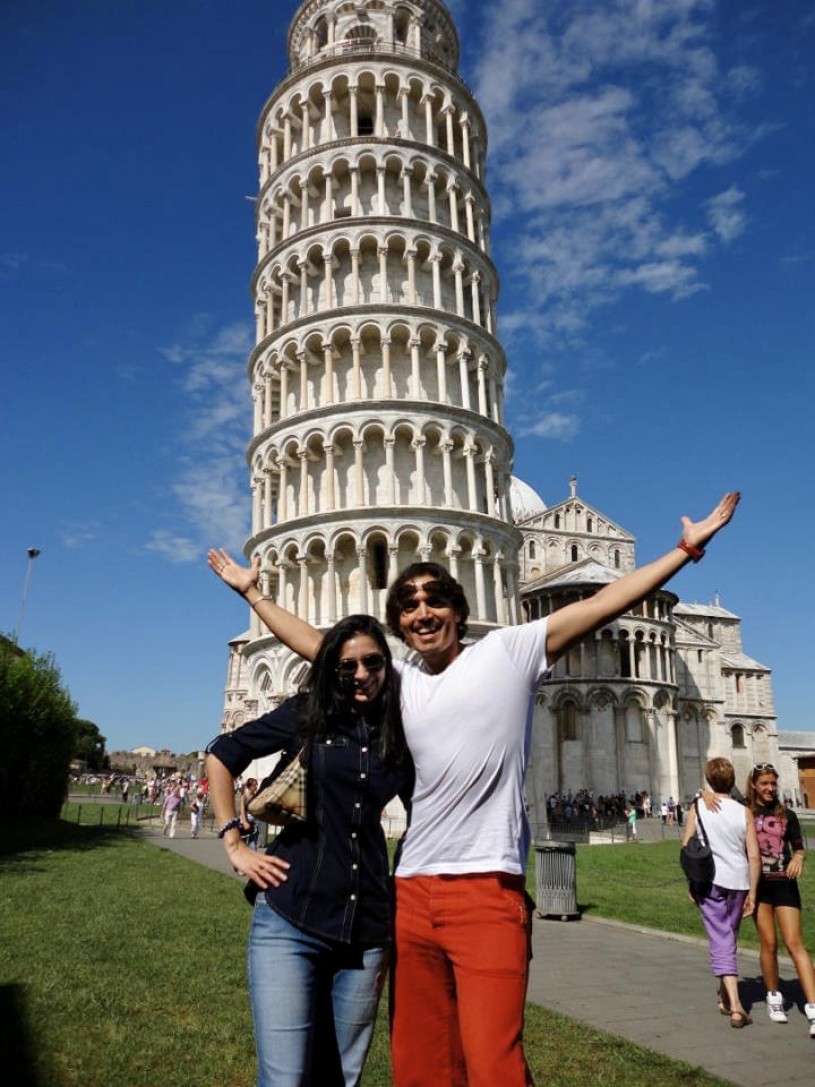
What is your process in selecting ingredients for your pizza’s?
From Monday to Wednesday, the Pasadena location is closed, which allows me to shop at the farmers markets. I hand pick as much as possible, and people say “Ali, that is crazy!” But to me, that is the passion of my work, and I see the return when guests try our food. They say “Oh my, one bite and I fell in love!”–and that is the idea!
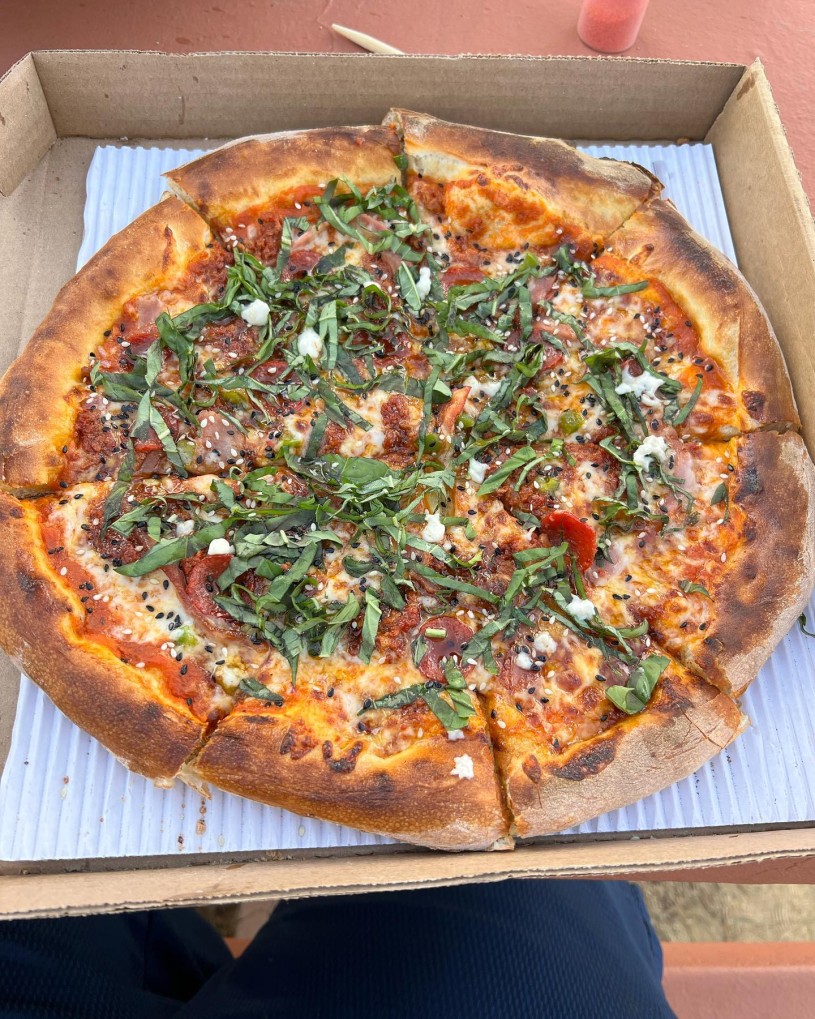
Our ingredients are 100% fresh, especially the halal meat we use. Halal in Arabic means permissible–meaning that it meets the standard of practice. The prerequisites [for halal] are that the animals were raised and killed humanely, with minimal harm done to the animal. The meat also cannot be frozen for a long time, so it is fresh. It is similar to kosher foods in the Jewish community. We love to tell folks that our food is halal, and we often get complimented when people try our meat.
Tell us about the name 786 Degrees.
Every entrepreneur goes through that moment when starting a business–the million-dollar question–what’s the name?! The name [of the business] is special because 786 is one of my culture’s most blessed and lucky numbers. I am half Iraqi and half Indian, and when I was trying to figure out what name to use, my Iraqi cousins told me that the number 786 logically means “may God shower blessings upon you.” And I said, “Dude, I need all the blessings!”
And the other reason I chose the name, is that 786 degrees falls squarely within the temperature range at which pizza Napolitana (though the certification rules) is supposed to be made.
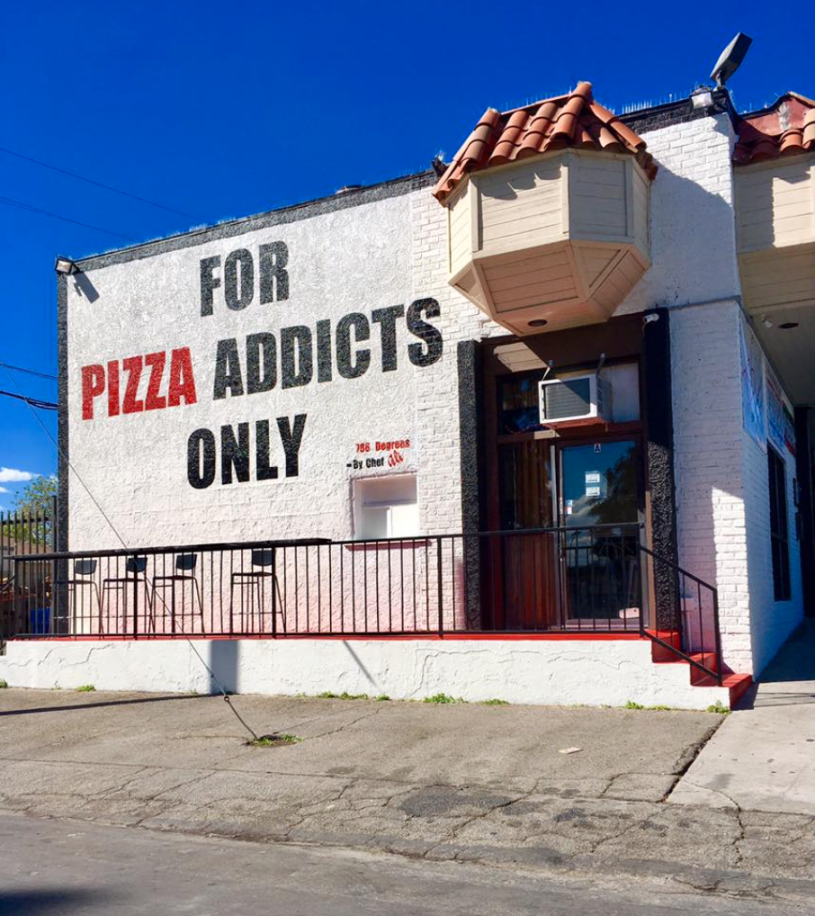
Why pizza?
When I was working in the automotive industry, I used to travel worldwide and loved eating street food. Since I am Muslim and don't drink or smoke, I had a lot of spare money! I used my extra money on food–always food. I feel that the magic of food comes alive on city streets through street vendors–where locals eat. [Street food] is where real flavor lies and the core of culture.
Traveling for work was great, but I wanted to settle down at one point since we had a baby on the way. I had zero experience [in the food industry] and didn't know anyone in the business, so it was a big jump for me. But I knew I loved food and the idea of pizza but did not want to replicate the mom-and-pop pizza places–I wanted something unique. So I said, “I’ll go to the motherland!” I flew to Napoli and tasted Neapolitan pizza for the first time.
I knew the restaurant I wanted to work at, so I introduced myself to the owner and told him that I didnt want a salary–I simply wanted to hang out with them and learn. The first couple of months, they pushed me to the front of the house since I spoke English and other languages so I functioned well as a server. But after some time, the owner finally said, “we cannot get rid of this guy!” And soon after, they brought me in the kitchen and showed me the ropes.
After some time, I applied for my Associazione Vera Pizza Napoletana certification, and I got certified! The certification shows mastery of making pizza in the Napoli style. The oven I have on the patio of the Pasadena location is very nostalgic for me. I tried my hand at making my own pizza oven and the first two ovens I made cracked on the first fire. The one people can see on the patio, that is the third one I built, and it came out pretty good! I added wheels to the oven and started my journey doing farmer's markets.
1 of 1
When 786 Degrees was just starting out they began in farmers markets around L.A.
Chef Ali uses a mobile pizza oven for catered events--he continues to do this today!
How are these ovens unique?
These ceramic pizza ovens are the mother of all modern ovens you see today. Essentially the ovens have to be strong enough to retain the energy (or heat) you produce inside without the heat escaping and cracking the ceramic walls. You should be able to touch the outside of the ovens while they are on and be cool to the touch.
Also, these ovens are heavy! The oven outside the shop weighs 3,000 pounds, and the one inside weighs 5,300 pounds. The inside of the ovens are pretty incredible–there are seven different layers of ceramic tiles which are made from lava ash clay imported from Hawaii. The strongest clay contains lava ash and the closest place to find it was in Hawaii. It was funny because people thought I was crazy, they were like, “Who is importing mud from Hawaii?”
This 5,300-pound ceramic oven was made the same way pizza ovens are made in Naples, Italy.
This is the third pizza oven that Chef Ali made himself!
1 of 1
This 5,300-pound ceramic oven was made the same way pizza ovens are made in Naples, Italy.
This is the third pizza oven that Chef Ali made himself!
How did you come to build your business and community in Sun Valley and Pasadena?
In 2015, I participated in the International Pizza Challenge in Las Vegas and won the title of Best Non-Traditional Pizza. It was then that we started getting many calls for interviews, and interviewers would tell me, “I cannot keep chasing you at different farmers markets!” So I started looking for places close to my home in Sun Valley and found my first location. It was close to my home, so I wouldn’t need to drive through traffic. The rent was inexpensive, and it was bigger than the space at farmers markets, so it was the right move for me. Sun Valley is far from central Los Angeles, but I believed in myself and knew that my pizzas would bring people to visit our shop.
We eventually opened up the Pasadena location, which accommodated more tables–but really, I did all of this to stay close to my family. People would say to me, “Ali, who goes into the restaurant business to be close to your family?” I responded with, “I will; watch me.”
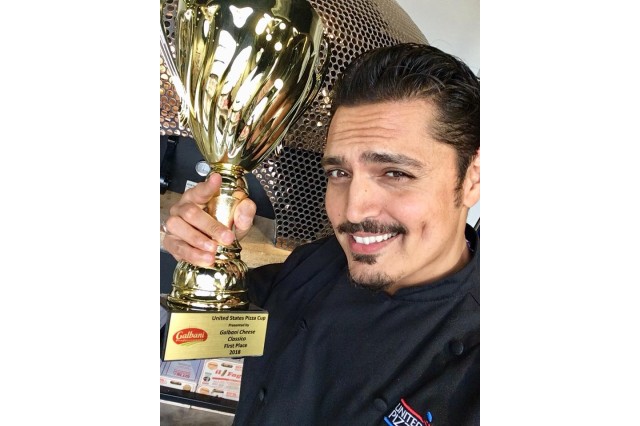
Chef Ali has won numerous awards for his exciting pizza creations, including first place at the United States Pizza Cup.
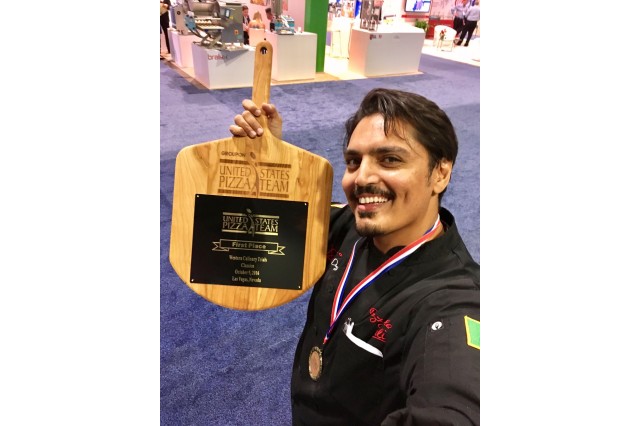
His accolades include winning first place in the Western Culinary and Acrobatic Trials in 2016.
1 of 1
Chef Ali has won numerous awards for his exciting pizza creations, including first place at the United States Pizza Cup.
His accolades include winning first place in the Western Culinary and Acrobatic Trials in 2016.
Are there any emotions or memories that arise while you are making pizza?
I remember moments with my mom. My mom is Indian, so she's very traditional and a great cook. I would go into the kitchen and try to help her out, but she would say, “No, go get your sister to help me.” I would tell her that I wanted to be a baker and learn from her when she was in the kitchen–I was always excited to chop, cut, and bake.
I worked in communications for nine years, then we bought a house– and [essentially] achieved the American dream. Everything seemed good, but I wasn't happy inside. My mom always said if you make your hobby your work, you never work a day in your life. So I listened to her advice, and now I enjoy every single day.
Do you have a favorite part of the baking process?
When I am making dough, and it is ready to be stressed, stretched, and turned into a pizza, I call it “happy dough.” It took time and experience, but I now can tell if dough is ready just by looking at it. It's a beautiful moment when that happy dough goes through the journey to become a perfect crust with delicious flavor.
How would you say your pizza binds people in the community together?
As I mentioned, I make it a point to have many different cultures represented in my food because I feel that everyone has special flavors to offer. For example, I have had someone from the Turkish community come in and see the Istanbul pizza on the menu, and they got so excited! We have had people say that our pizza reminds them of their grandmother’s cooking, which is such a compliment. People get to experience other cultural foods [and flavors] here, and they really enjoy it!
786 Degrees is located in South Pasadena and Sun Valley.
1 of 1
786 Degrees Bombay Tikka Masala is a staple.
786 Degrees is located in South Pasadena and Sun Valley.
EXPLORE MORE 786 DEGREES
To see what is cooking at 786 Degrees go to 786Degrees.com and find the pizza shop nearest you.
SHARE YOUR L.A. BREAD STORIES
Have you visited 786 Degrees or know of another L.A. breadmaker who lovingly connects with their community? We want to hear from you! Join the conversation on social media and tag us @NHMLA with #kneadedLA.
Following the success of Kneaded: L.A. Bread Stories, we're celebrating the history, heritage, and communities of Los Angeles through the lens of different cultural traditions. This year, L.A. at Play highlights the vibrant and visionary work of artisans who fabricate dolls and figurines using a variety of techniques and materials.
